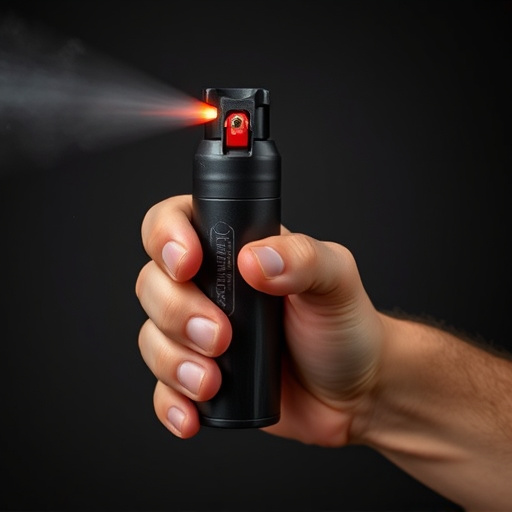Bear spray and personal pepper spray, though both self-defense tools, serve distinct purposes. Bear spray deters large wildlife from a safe distance with its powerful capsaicin mixture, while personal pepper spray causes temporary blindness and respiratory distress in human assailants up close. Bear spray offers longer range but reduced effectiveness against humans, while pepper spray has shorter reach but is optimized for direct impact. The optimal choice depends on individual needs: pepper spray for urban safety and bear spray for outdoor activities or wildlife encounters.
In the realm of personal protection, understanding the nuances between Bear Spray and Personal Pepper Spray is paramount. These two self-defense tools, while similar in purpose, differ significantly in application and effectiveness. This article delves into the key distinctions between Bear Spray and Personal Pepper Spray, analyzing their pros and cons to help you choose the right self-defense tool for your needs. From range and potency to legal considerations, we’ll guide you through the factors that make these options unique.
- Understanding Bear Spray and Personal Pepper Spray: Key Differences
- Pros and Cons of Each: A Comprehensive Analysis
- Choosing the Right Self-Defense Tool: Factors to Consider
Understanding Bear Spray and Personal Pepper Spray: Key Differences
Bear spray and personal pepper spray are both designed for self-defense, but they have distinct properties that set them apart. Bear spray, as the name suggests, is specifically formulated to deter bears, using a potent mixture of capsaicin, a compound found in chili peppers, with other additives to increase its effectiveness against large wildlife. It’s typically used at a safe distance, usually around 20 feet (6 meters), and is designed to create a distracting fog that can give you time to escape from aggressive animals like bears or cougars.
In contrast, personal pepper spray is meant for close-range self-defense against humans. This type of spray delivers a high concentration of capsaicin directly into the eyes and respiratory system, causing temporary blindness, coughing, and difficulty breathing, allowing the user to disable their assailant long enough to escape or seek help. Personal pepper spray has a shorter range than bear spray—typically around 3-5 feet (1-2 meters)—and its potency is tailored for human threats rather than wildlife deterrence.
Pros and Cons of Each: A Comprehensive Analysis
Pros and Cons of Each: A Comprehensive Analysis
When comparing bear spray and personal pepper spray, understanding their unique advantages and drawbacks is crucial for making an informed decision about personal protection. Bear spray, designed to deter large wildlife, offers a wide range of protection thanks to its non-lethal, yet powerful, pepper-based formula that can effectively disable an attacker at a relatively safe distance. Its long reach and ability to provide defensive options against various threats make it appealing for outdoor enthusiasts and individuals living in rural areas. However, bear spray may not be as effective in close-quarters combat or against determined assailants due to its range limitations and potential for wind direction issues.
On the other hand, personal pepper spray is a direct-impact agent optimized for self-defense scenarios at close range. It’s highly effective in incapacitating an attacker temporarily, allowing the user to escape or seek help. Personal pepper spray is also generally more affordable and easier to carry discreetly. However, its short range means it may not offer enough defensive distance, and wind or weather conditions can significantly reduce its effectiveness. Unlike bear spray, personal pepper spray is not designed for wildlife deterrence, making its application strictly focused on human threats.
Choosing the Right Self-Defense Tool: Factors to Consider
When considering a self-defense tool, understanding the nuances between options like bear spray and personal pepper spray is essential. Each has unique advantages and applications. Pepper spray, for instance, is designed to temporarily disable an attacker by irritating the eyes, nose, and throat, making it a popular choice for personal protection. It’s effective against both humans and animals, but its range is limited, usually requiring close contact.
On the other hand, bear spray is formulated to deter larger, more aggressive threats, like bears or other wildlife. With a longer reach and faster knockdown effect, it offers a safer option in outdoor scenarios. However, bear spray isn’t as effective against humans as personal pepper spray due to its milder formulation. The choice ultimately depends on your specific needs: if you’re primarily concerned with personal safety in urban areas, a good quality personal pepper spray might be more suitable; if your focus is on outdoor activities or dealing with wild animals, bear spray could be the better investment.
When it comes to personal protection, both bear spray and pepper spray offer effective self-defense options, each with its unique advantages and drawbacks. Understanding the key differences between these two compounds is essential for making an informed decision. In terms of Bear Spray Vs Personal Pepper Spray, choosing the right tool ultimately depends on your specific needs and potential threats. By considering factors like range, effectiveness against different adversaries, and ease of use, individuals can select the optimal self-defense mechanism to ensure their safety in various situations.
